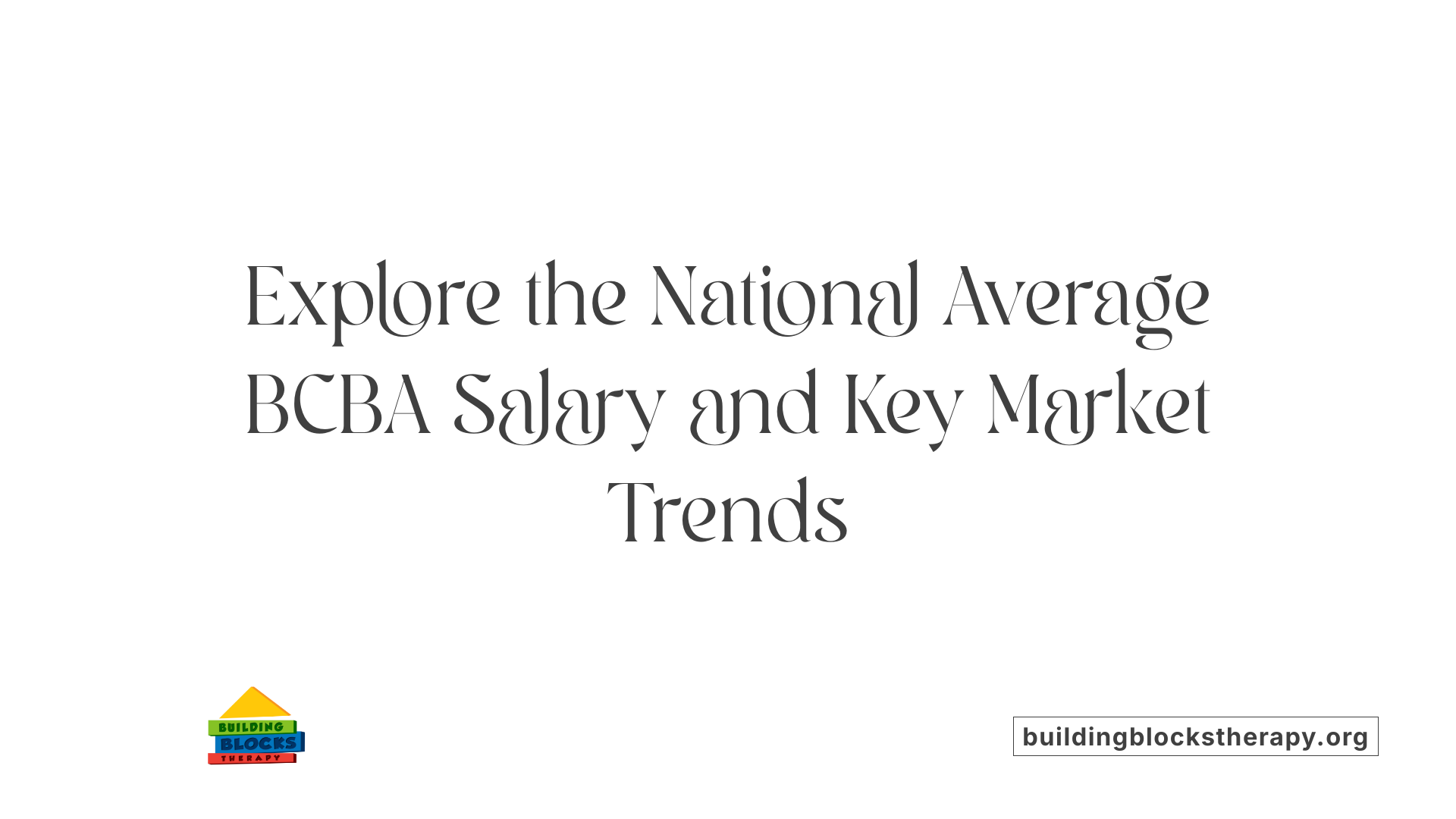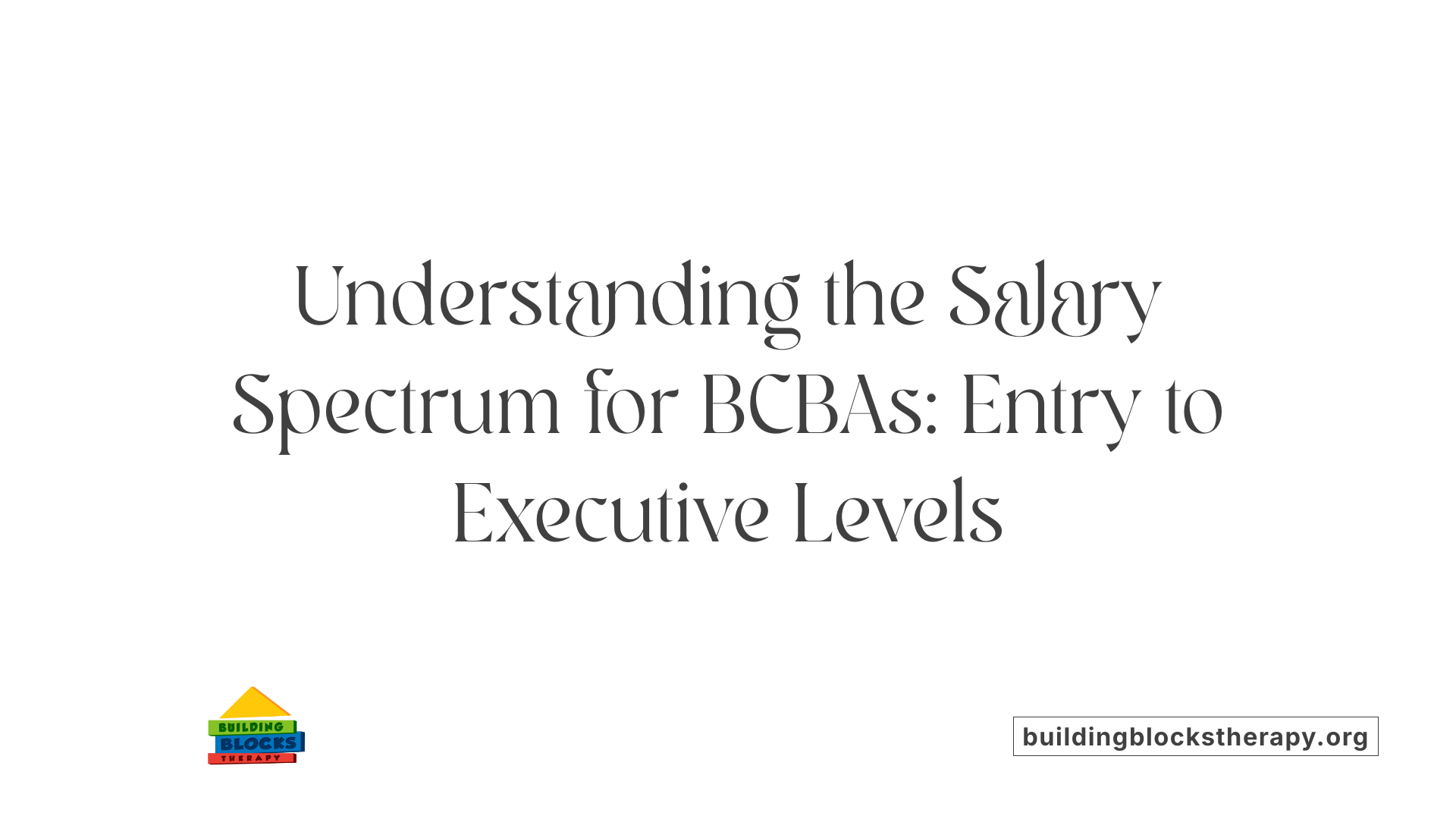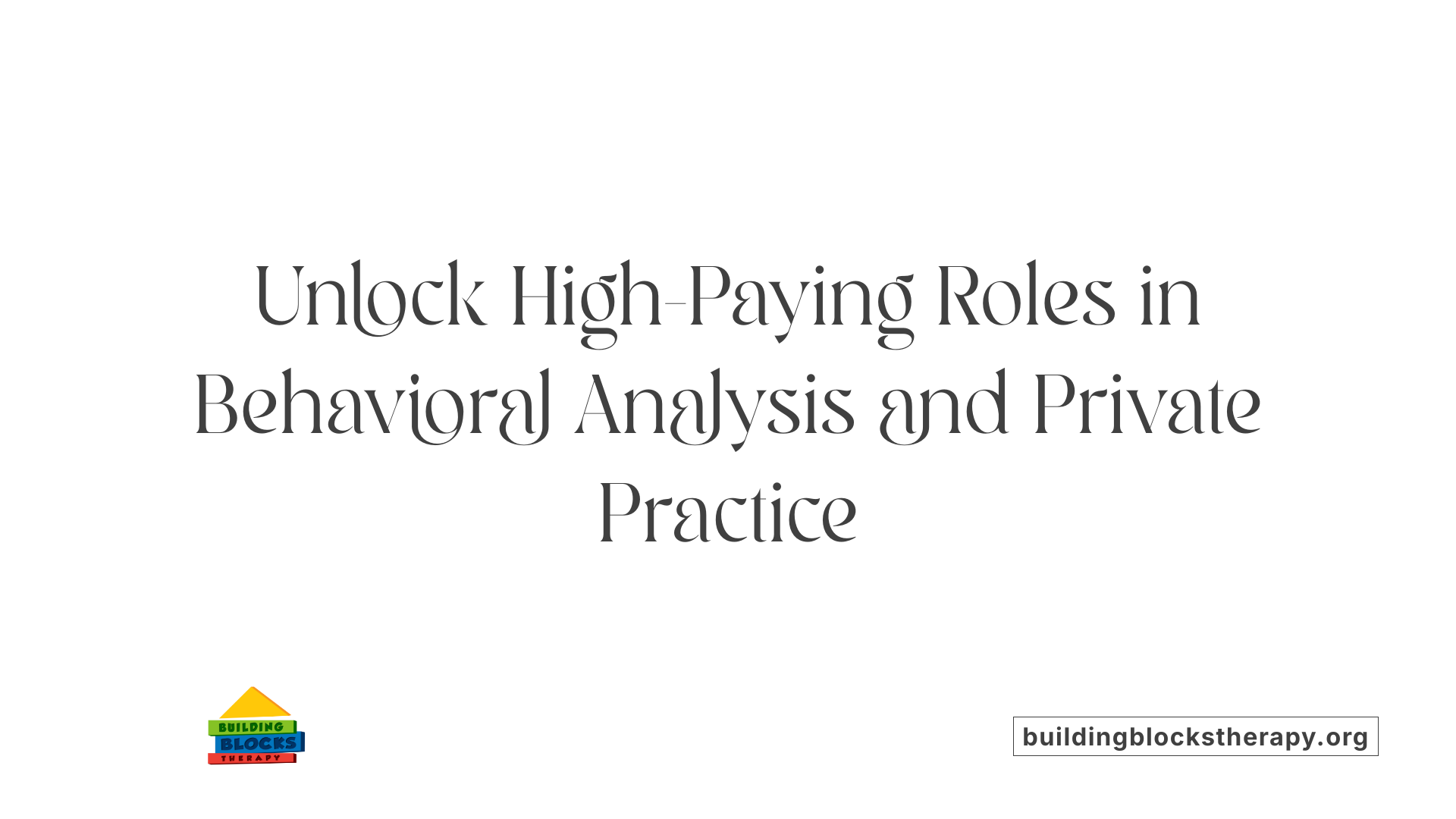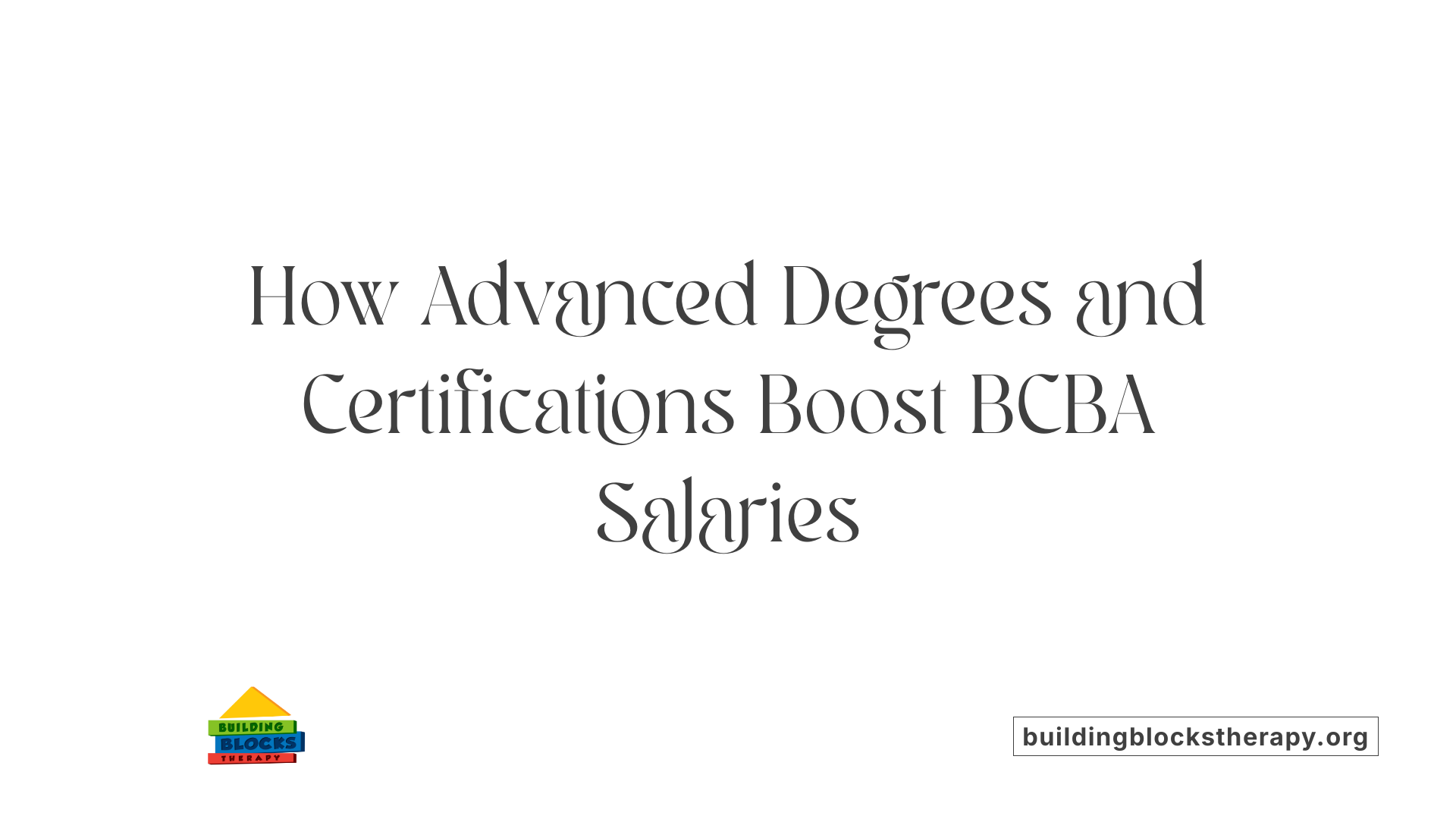A Comprehensive Look at BCBA Salary Expectations
The field of behavioral analysis, particularly for Board Certified Behavior Analysts (BCBAs), offers promising career opportunities with competitive salaries. As demand for behavioral health services continues to grow, so does the earning potential for professionals in this specialization. This article provides a detailed overview of average salaries, influential factors, regional differences, and future outlooks for BCBAs across the United States, helping both aspiring and seasoned practitioners understand the financial landscape of their profession.
Average Salary for a BCBA in the United States
 The typical annual salary for a Board Certified Behavior Analyst (BCBA) varies across different states and experience levels. As of 2023, the national average salary hovers around $85,571, according to recent data from ZipRecruiter, reflecting nationwide trends in demand and compensation.
The typical annual salary for a Board Certified Behavior Analyst (BCBA) varies across different states and experience levels. As of 2023, the national average salary hovers around $85,571, according to recent data from ZipRecruiter, reflecting nationwide trends in demand and compensation.
This figure represents a median point in a salary spectrum that ranges from approximately $50,000 for entry-level positions to over $120,000 for experienced professionals or those working in specialized roles such as management or private practice. The high paying states include New Jersey, Massachusetts, and Hawaii, where BCBAs can earn significantly more than the national average.
Data from various sources, including job boards like Indeed and ZipRecruiter, suggest that the average salary for a BCBA in the U.S. is roughly $82,120, with some variations depending on location, education, and experience. For example, BCBAs in top-paying cities such as Santa Cruz, CA, and Redwood City, CA, can earn over $110,000 annually.
Compared to other roles in the behavioral health field, salary differences are notable. Registered Behavior Technicians (RBTs) earn about $36,763 per year, while those with a bachelor’s in behavior analysis (BCaBA) earn approximately $54,274. Professionals with higher degrees and leadership roles tend to see compensation increase substantially, with salaries exceeding $100,000 in management positions.
In summary, the BCBA profession offers competitive salaries that are influenced by location, education, and experience, with a positive outlook driven by growing demand in the field and a projected growth rate of over 20% in the coming years.
Factors Impacting BCBA Salaries
What are the factors that influence BCBA salaries?
Several elements come into play when determining the earnings of a board-certified behavior analyst (BCBA). One of the most prominent factors is geographic location. Salaries tend to be higher in states such as New Jersey, Wisconsin, and Massachusetts, where demand and cost of living are greater. Metropolitan areas generally offer more lucrative opportunities, reflecting a higher demand for ABA (Applied Behavior Analysis) services.
Educational background, including advanced degrees or additional certifications, also influences income. Professionals holding a doctoral degree or specialized certifications like BCBA-D or in organizational behavior management typically earn more. These qualifications signal a higher level of expertise and open doors to advanced positions.
Experience levels significantly impact salary progression. Entry-level BCBAs usually start earning between $50,000 and $60,000, while those with 10 or more years may see salaries exceeding $77,000 and even reach over $120,000 in senior or management roles. The number of years in the field correlates positively with compensation.
Workplace setting and industry sector are crucial factors. BCBAs working in private practice, healthcare, or specialized consultancy roles often command higher wages—sometimes up to $120,000—due to the nature of their work and market demand. Conversely, roles in educational settings or non-profit organizations tend to offer lower salaries.
Finally, pursuing higher levels of specialization or certification in high-demand areas can boost earnings. Additional professional development, such as expertise in organizational behavior management or leadership skills, can lead to higher-paying positions, management roles, or consultancy opportunities. Overall, these factors collectively shape the earning potential of BCBA professionals.
Salary Range for BCBAs

What is the typical salary range for a BCBA?
The earnings of board-certified behavior analysts (BCBAs) vary significantly based on several factors. Most commonly, a BCBA’s annual salary ranges from approximately $70,000 to $120,000. Entry-level professionals typically start around $50,000 to $60,000 per year, while those with more experience or in higher-paying sectors can earn over $100,000.
The average salary for a BCBA across the United States hovers around $85,571, with some reports indicating median total compensation could be closer to $121,000 annually. At the higher end of the scale, top earning BCBAs can make more than $200,000, especially when working in management, specialized roles, or private practices.
Variability based on experience and location
Experience plays a substantial role in salary levels. For instance, BCBAs with 10 to 19 years of experience typically earn over $77,000 a year. Salaries naturally tend to increase with additional years in the field.
Location is also a major factor affecting pay. States like Alaska and California offer higher average salaries, with figures reaching up to $98,700 and over $110,000 respectively. Cities like Santa Cruz, CA, and Redwood City, CA, also feature high salaries, sometimes over $112,000 annually.
Starting salaries vs. top-earners
Newly certified BCBAs generally start out earning between $27,000 and $50,000, depending on the sector and location. Conversely, those in senior or leadership roles, or working in private practice, often command salaries that can surpass $120,000.
Travel BCBAs and professionals in high-demand areas or institutions may earn between $74,000 and $132,500 per year, reflecting the high demand for skilled behavior analysts.
Median, quartiles, and top percentiles
The salary distribution shows that the 25th percentile starts around $70,000, indicating the lower range of typical salaries. The 75th percentile is around $89,500, which represents more experienced professionals.
The top 10% of earners make approximately $83,187 annually, while the lowest 10% earn about $56,135.
Range in different sectors and settings
Salaries also depend on the work setting. Positions in healthcare, private practice, or management tend to pay more, with private practice roles offering salaries up to $120,000.
Overall, the BCBA career offers a broad salary spectrum, influenced by location, experience, role, and industry sector, coupled with a very positive outlook given the projected growth rate of over 20% in the coming years.
| Salary Level | Typical Range | Notes |
|---|---|---|
| Entry-Level | $27,000 - $50,000 | New certification, initial positions |
| Mid-Level | $60,000 - $80,000 | Experience and specialization |
| Senior/Management | $85,000 - over $135,000 | Leadership roles, private practice |
| Top 10% | over $83,000 | Highest earning professionals |
| Bottom 10% | around $56,000 | Lower end of pay scale |
This variation demonstrates the potential for growth within the field, rewarding knowledgeable and experienced BCBAs in much higher salary brackets depending on their chosen industry and geographical location.
High-Earning Opportunities in Behavioral Analysis

Can a BCBA earn six figures?
Certainly. Many BCBAs working in specialized roles, management, or private practice can earn salaries exceeding $100,000 annually. Some top-tier professionals report earning between $120,000 and $135,000, especially in high-demand locations or senior positions.
What about leadership and senior roles?
Leadership positions in behavioral health, such as program directors or clinical managers, often come with higher salaries. These roles can command $100,000 or more annually due to increased responsibility and expertise.
How does private practice impact earning potential?
Working in private practice or consulting can significantly boost income. BCBAs in private settings have reported annual earnings up to $120,000, benefiting from flexible hours, independent clients, and higher billing rates.
Are there earnings advantages for Travel BCBAs?
Travel BCBAs typically earn between $74,000 and $132,500 annually. The travel component often includes stipends or allowances, providing additional compensation and opportunities to work in diverse environments.
Which cities and sectors offer the highest pay?
Certain cities and sectors stand out for higher wages. Notable cities include Santa Cruz, CA ($112,456), Redwood City, CA ($111,014), and Union City, CA ($110,757). Sectors like healthcare, private practice, and management also tend to offer better pay compared to educational settings.
| Location or Sector | Average Salary | Notable Details |
|---|---|---|
| Top paying states | Up to $98,707 in New Jersey | Cost of living influences salaries |
| High-paying cities | $112,456 in Santa Cruz, CA | Leading wages in urban, high-demand areas |
| Sector (Private Practice) | Up to $120,000 | Highest compensation among sectors |
| Leadership roles | $100,000+ | Management and specialist positions |
The growth in demand for BCBAs continues to climb, with a strong upward trend projected well into the next decade, often translating into increased earning opportunities across various regions and roles.
Regional Salary Differences and Top Paying States

What are the states with the highest average salaries for BCBAs?
In the United States, certain states stand out for offering higher average salaries to Board-Certified Behavior Analysts (BCBAs). New Jersey leads with an average salary of approximately $98,707 annually. Other high-paying states include Wisconsin ($96,396), Alaska ($94,011), Massachusetts ($93,884), Oregon ($93,581), and Washington ($93,576). These states usually feature higher costs of living and increased demand for ABA services.
California also offers some of the highest compensation, with BCBAs earning around $90,556 on average. New York follows closely with averages around $84,615, making these states attractive for professionals seeking higher earnings.
How does the cost of living influence BCBA salaries?
Higher salaries in states like New Jersey and California are often associated with the higher cost of living in these areas. Cities within these states, such as Santa Cruz and Redwood City, CA, have some of the top salaries for BCBAs, exceeding $112,000 annually. When considering job offers, professionals should evaluate cost of living factors, as higher salaries may be offset by increased expenses for housing, transportation, and other essentials.
Which cities and metropolitan areas offer the top BCBA salaries?
Major metropolitan areas like Santa Cruz, CA; Redwood City, CA; and Union City, CA, are known for their lucrative BCBA positions, with salaries over $110,000. Atkinson, Nebraska, and several cities in California also rank highly for BCBA compensation, often exceeding $87,000 per year.
Travel BCBAs working across regions can command between $74,000 and $132,500 annually, especially when working in areas with high demand or in specialized roles.
Are there differences in pay across sectors?
Yes, salaries vary significantly by sector. BCBAs working in private practices, healthcare, or educational sectors often have higher earning potential. Private practice roles can bring in up to $120,000 annually, particularly in management or leadership positions.
In summary, BCBAs in high-demand states and metropolitan areas generally enjoy the highest salaries. Location, sector, and professional experience all play crucial roles in determining earning potential. For professionals aiming to maximize income, considering state and city choice, along with advancing certifications and gaining experience, can lead to better compensation and career growth.
Fast Facts on Regional Salary Variations
| State/City | Average Salary | Notable Features |
|---|---|---|
| New Jersey | $98,707 | Highest state average |
| California | $90,556 | High salaries in top cities |
| Massachusetts | $93,884 | Dense demand sector |
| Santa Cruz, CA | $112,456 | Top city salary |
| Redwood City, CA | $111,014 | Top city salary |
| Private Practice | Up to $120,000 | Highest sector pay |
This overview highlights the importance of regional differences in salary expectations for BCBAs across the USA, emphasizing areas with the best earning opportunities.
Growth Trends and Future Salary Outlook
What is the salary outlook for BCBAs in the field of behavioral analysis?
The future for BCBAs in behavioral analysis looks very promising. Job demand has soared over recent years, with the number of available positions increasing from just 789 in 2010 to an impressive 57,596 in 2022. This growth, over 4,200 percent in a decade, reflects a booming industry with expanding opportunities.
As the industry continues to grow, salaries are expected to rise accordingly. Currently, BCBAs working in management or specialized areas can earn upwards of $100,000 per year. The general salary trend across the profession is upward, especially for those with advanced certifications or experience.
Additional factors contributing to higher earnings include geographic location, level of education, and professional specialization. For example, BCBAs in high-demand states like New Jersey, Massachusetts, and Hawaii often see higher average salaries compared to the national average.
Overall, the outlook indicates sustained growth in employment opportunities and a positive trajectory for salary increases. As awareness and utilization of Applied Behavior Analysis (ABA) expand, BCBAs are positioned to benefit from ongoing industry expansion and career development.
Impact of Education and Certifications on Salaries

What are the factors that influence BCBA salaries?
Several factors significantly affect how much BCBAs earn. Geographic location plays a crucial role, with higher salaries typically found in states like New Jersey, Massachusetts, and Washington, D.C., where the demand for ABA services is greater and the cost of living is higher.
Educational qualifications are another major determinant. Professionals with advanced degrees such as a master's, doctoral, or specialized certifications tend to command higher salaries. For example, BCBAs with a doctoral degree can earn between $90,000 and $120,000, while those with only a basic certification may start around $50,000.
Experience level is also influential; the more years a BCBA has worked in the field, the more they can expect to earn, with salaries surpassing $77,000 after 10-19 years of practice.
Workplace setting impacts earnings as well. BCBAs working in private practice, healthcare, or in management roles often make more—sometimes exceeding $100,000—compared to those in non-profit or educational settings.
Lately, ongoing professional development and specialization in high-demand areas can boost earning potential further. Skills in organizational behavior management or additional certifications like BCBA-D also tend to result in higher wages.
| Certification Level | Typical Salary Range | Additional Notes |
|---|---|---|
| Entry-Level (Basic BCBA) | $50,000 - $60,000 | Starting salaries for new professionals |
| Mid-Level | $60,000 - $80,000 | With 5-10 years of experience |
| Senior-Level | Over $85,000 | Leadership roles and specialization |
| Doctoral/Advanced | $90,000 - $120,000 | Highest earning potential |
By investing in higher degrees and specialized certifications, BCBAs can significantly increase their earning capacity and secure more advanced and lucrative roles in the field.
Summary and Career Outlook
The salary landscape for board-certified behavior analysts (BCBAs) is diverse and promising. On average, BCBAs earn around $85,571 annually as of July 2023, with top states like New Jersey and Wisconsin offering salaries exceeding $94,000. The pay scale varies widely, ranging from about $50,000 at entry-level to over $120,000 for experienced or managerial roles.
Demand for BCBAs is growing rapidly, with job postings increasing over 4,200% from 2010 to 2022. This surge reflects the increasing need for behavioral health professionals across various sectors, including private practice, healthcare, and education.
High earners, particularly those in leadership or specialized roles, can surpass $100,000 each year. Urban centers in states with high living costs, such as California and New York, tend to offer the highest salaries—over $110,000 in some cities—demonstrating location as a significant factor.
For upcoming BCBAs, shaping a successful career involves gaining advanced certifications, accumulating experience, and exploring high-demand locations. Working in private practice or holding management positions can substantially boost earnings.
Overall, the outlook for BCBAs remains highly positive. With an expected 20-22% growth rate over the next decade, professionals in this field can anticipate increasing opportunities, competitive salaries, and career advancement potential.
Implications for Future Behavior Analysts
As the demand for behavioral analysis continues to grow exponentially, earning potential for BCBAs is set to improve markedly. Professionals equipped with advanced degrees, certifications, and experience will find themselves uniquely positioned to capitalize on industry expansions. Geographic location remains a crucial factor, with some states and cities offering significantly higher salaries due to demand and cost of living. For those considering entering this field, prospects are promising not only for fulfilling work but also for financial stability and career growth. Staying informed about industry trends and continuously upgrading professional credentials will ensure BCBAs remain competitive and well-compensated in this vibrant, expanding field.
References
- BCBA and ABA Salaries by State - Applied Behavior Analysis Degrees
- Board-Certified Behavior Analyst (BCBA) Salary Guide
- BCBA Salary by State | Flywheel Centers
- Average BCBA Salary By State - Autism Center of Excellence
- What State Pays BCBA the Most? - All Star ABA
- BCBA and ABA Salaries by State - Applied Behavior Analysis Degrees
- Board-Certified Behavior Analyst (BCBA) Salary Guide
- BCBA and ABA Salary by State for 2025 - Research.com






